人教版(2019)选择性必修第二册Unit 4 Journey across a Vast Land 现在分词与过去分词的区别课件(共48张PPT)
文档属性
| 名称 | 人教版(2019)选择性必修第二册Unit 4 Journey across a Vast Land 现在分词与过去分词的区别课件(共48张PPT) |
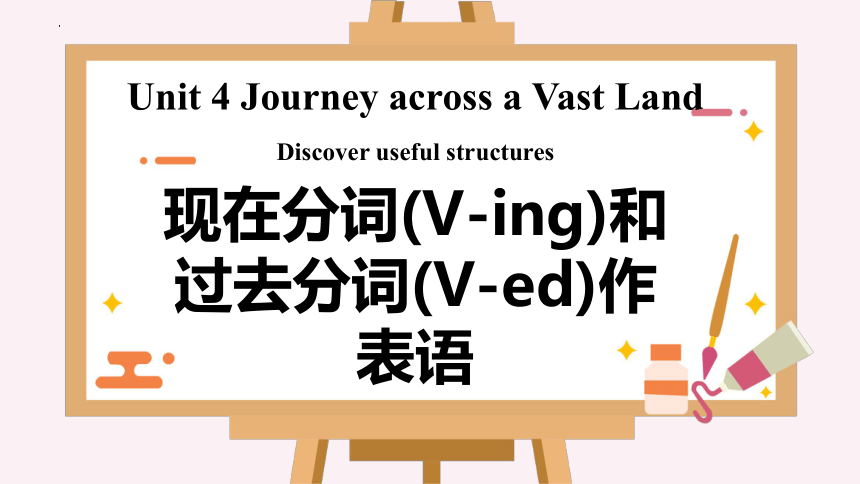
|
|
| 格式 | pptx | ||
| 文件大小 | 8.8MB | ||
| 资源类型 | 教案 | ||
| 版本资源 | 人教版(2019) | ||
| 科目 | 英语 | ||
| 更新时间 | 2024-01-12 00:00:00 | ||
图片预览

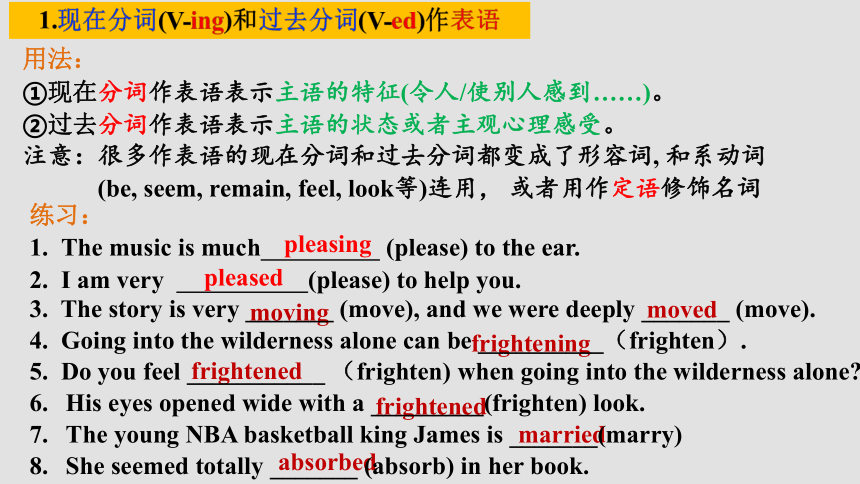
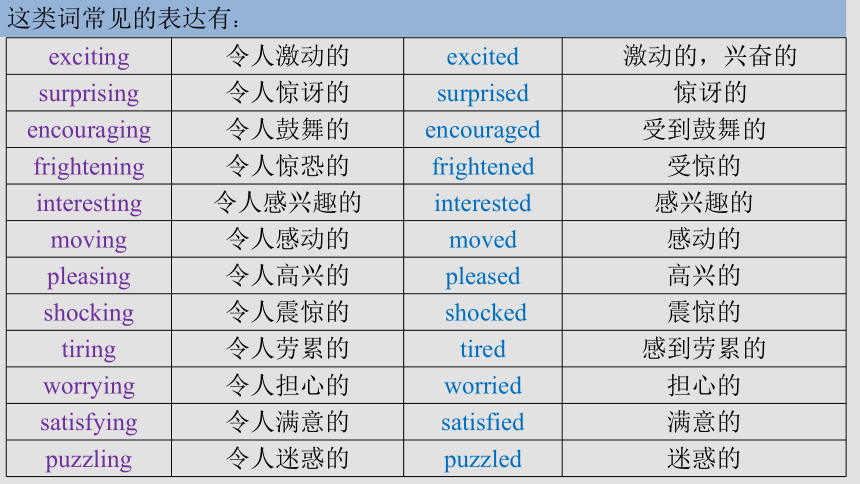
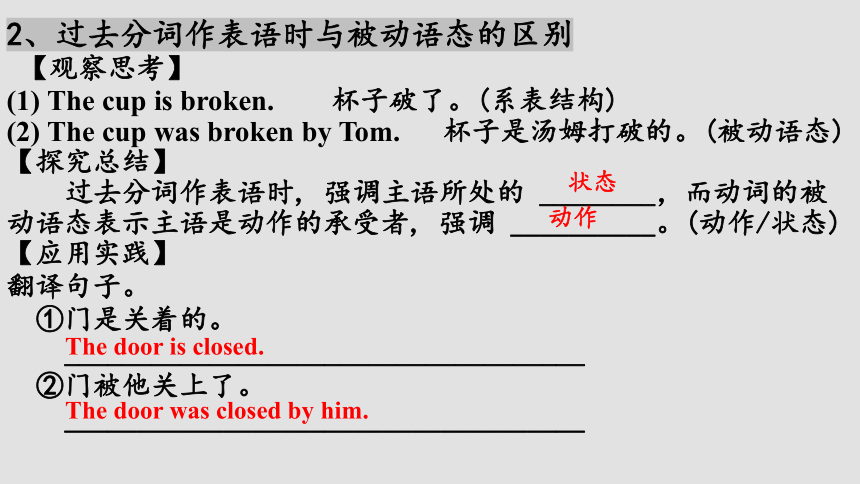
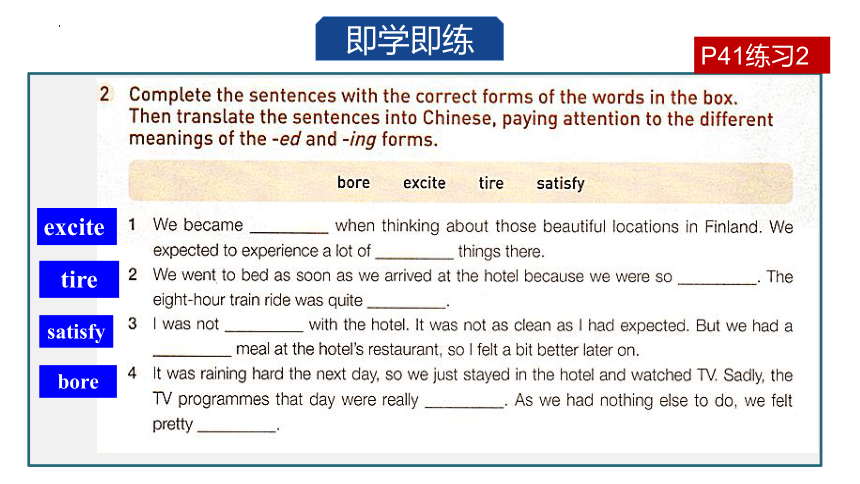
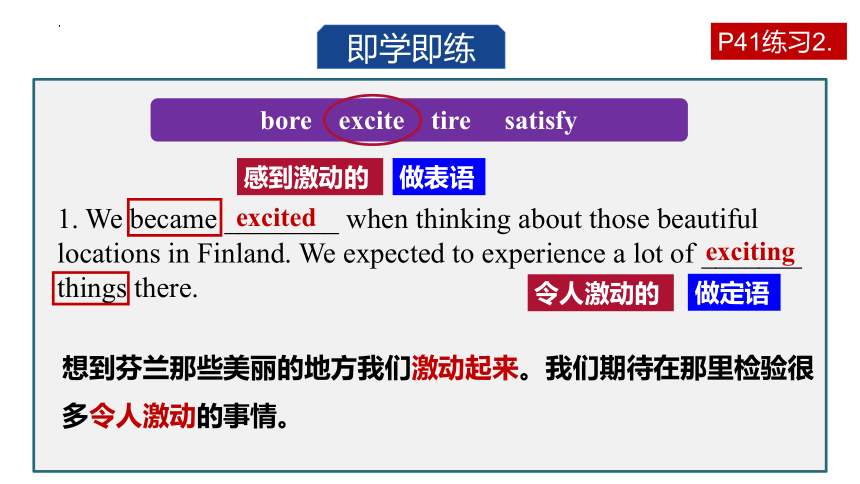
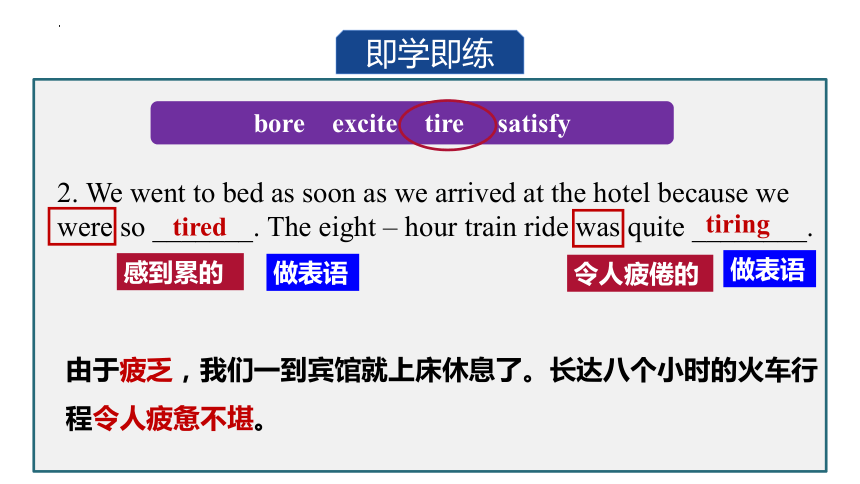
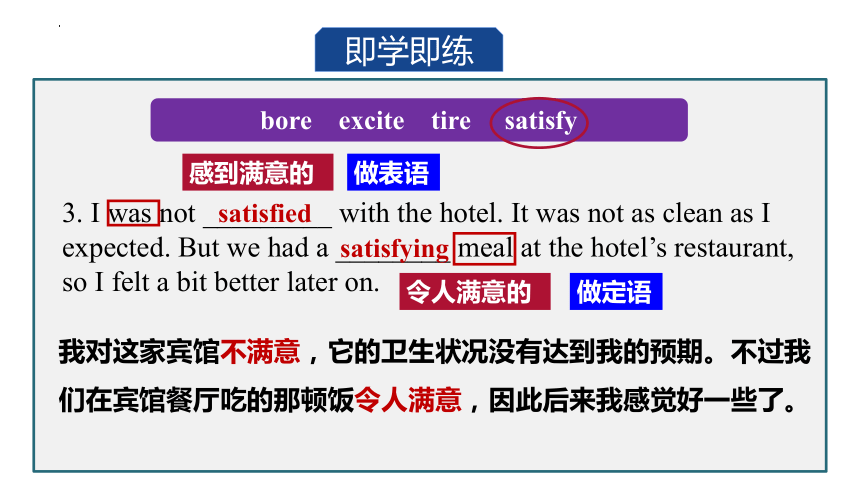
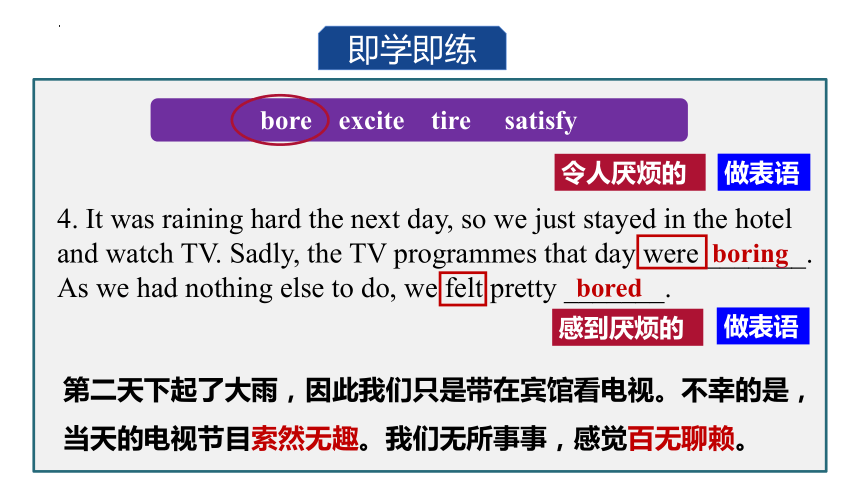
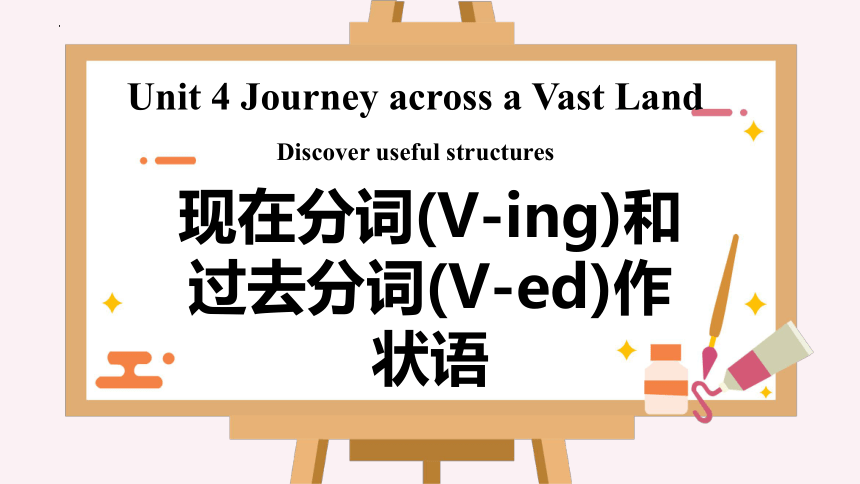

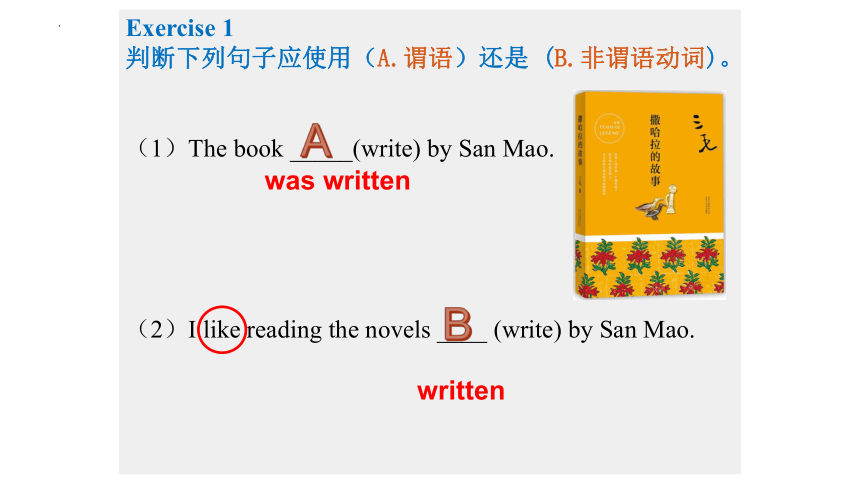
文档简介
(共48张PPT)
Unit 4 Journey across a Vast Land
Discover useful structures
现在分词(V-ing)和过去分词(V-ed)作表语
1.现在分词(V-ing)和过去分词(V-ed)作表语
用法:
①现在分词作表语表示主语的特征(令人/使别人感到……)。
②过去分词作表语表示主语的状态或者主观心理感受。
注意:很多作表语的现在分词和过去分词都变成了形容词, 和系动词
(be, seem, remain, feel, look等)连用, 或者用作定语修饰名词
moving
frightened
frightening
moved
frightened
married
absorbed
pleased
pleasing
3. The story is very _______ (move), and we were deeply _______ (move).
4. Going into the wilderness alone can be __________(frighten).
5. Do you feel ___________ (frighten) when going into the wilderness alone
His eyes opened wide with a _________(frighten) look.
The young NBA basketball king James is _______(marry)
She seemed totally _______ (absorb) in her book.
练习:
1. The music is much (please) to the ear.
2. I am very (please) to help you.
exciting 令人激动的 excited 激动的,兴奋的
surprising 令人惊讶的 surprised 惊讶的
encouraging 令人鼓舞的 encouraged 受到鼓舞的
frightening 令人惊恐的 frightened 受惊的
interesting 令人感兴趣的 interested 感兴趣的
moving 令人感动的 moved 感动的
pleasing 令人高兴的 pleased 高兴的
shocking 令人震惊的 shocked 震惊的
tiring 令人劳累的 tired 感到劳累的
worrying 令人担心的 worried 担心的
satisfying 令人满意的 satisfied 满意的
puzzling 令人迷惑的 puzzled 迷惑的
这类词常见的表达有:
2、过去分词作表语时与被动语态的区别
【观察思考】
(1) The cup is broken. 杯子破了。(系表结构)
(2) The cup was broken by Tom. 杯子是汤姆打破的。(被动语态)
【探究总结】
过去分词作表语时, 强调主语所处的 ________,而动词的被动语态表示主语是动作的承受者, 强调 __________。(动作/状态)
【应用实践】
翻译句子。
①门是关着的。
____________________________________
②门被他关上了。
____________________________________
状态
动作
The door is closed.
The door was closed by him.
即学即练
excite
satisfy
tire
bore
P41练习2
即学即练
bore excite tire satisfy
1. We became ________ when thinking about those beautiful locations in Finland. We expected to experience a lot of _______ things there.
想到芬兰那些美丽的地方我们激动起来。我们期待在那里检验很多令人激动的事情。
excited
exciting
感到激动的
令人激动的
做表语
做定语
P41练习2.
即学即练
bore excite tire satisfy
2. We went to bed as soon as we arrived at the hotel because we were so _______. The eight – hour train ride was quite ________.
由于疲乏,我们一到宾馆就上床休息了。长达八个小时的火车行程令人疲惫不堪。
tired
tiring
感到累的
令人疲倦的
做表语
做表语
即学即练
bore excite tire satisfy
3. I was not _________ with the hotel. It was not as clean as I expected. But we had a ________ meal at the hotel’s restaurant, so I felt a bit better later on.
我对这家宾馆不满意,它的卫生状况没有达到我的预期。不过我们在宾馆餐厅吃的那顿饭令人满意,因此后来我感觉好一些了。
satisfied
satisfying
感到满意的
做表语
令人满意的
做定语
即学即练
bore excite tire satisfy
4. It was raining hard the next day, so we just stayed in the hotel and watch TV. Sadly, the TV programmes that day were _______. As we had nothing else to do, we felt pretty _______.
第二天下起了大雨,因此我们只是带在宾馆看电视。不幸的是,当天的电视节目索然无趣。我们无所事事,感觉百无聊赖。
令人厌烦的
做表语
boring
bored
感到厌烦的
做表语
Unit 4 Journey across a Vast Land
Discover useful structures
现在分词(V-ing)和过去分词(V-ed)作状语
01
Review
Exercise 1
判断下列句子应使用(A.谓语)还是 (B.非谓语动词)。
(1)The book _____(write) by San Mao.
(2)I like reading the novels ____ (write) by San Mao.
written
A
B
was written
(3)He_____(go) into the classroom, opened his book and wrote on the blackboard.
(4)Although it is winter now, the tree in the school campus ____(look) beautiful.
A
A
went
looks
(5)The girl that lives in the city _____(make) a phone call to the farmer yesterday.
(6)She got off the bus, but _____(leave) her book in the bus.
(7)She got off the bus, ______(hold) her book.
(8)_______(drive) by a burning desire for adventure, Li Ming left home and started to travel around his early twenties
A
A
B
made
left
holding
B
Driven
如果句中已经存在一个 动词,
那么在没有 的情况下,
这个句子就是 句,
那么,另一个动词要选用 动词。
→ 复习:
谓语
连词或引导词
简单
非谓语
1.使用非谓语动词的条件:
2
1
点击添加文本
点击添加文本
点击添加文本
点击添加文本
Summary总结:
判断非谓语动词的形式:
→ 表目的和将来,用__________________
→ 表主动和进行,用__________________
→ 表被动和完成,用__________________
确定谓语动词 or 非谓语动词 ?
→填非谓语动词:句子中已有 且无 。
逻辑主语
与非谓语
之间
谓语动词
连词或引导词
不定式to do
现在分词doing
过去分词done
一、过去分词作状语
过去分词(短语)在句中作状语可以表示时间、原因、条件、让步、方式或伴随等,其逻辑主语就是句子的主语。 。
1. 表示时间
过去分词(短语)作时间状语,相当于由when ,while, until等连词引导的________从句。
e.g. Asked what had happened, he lowered his head.
(=When he was asked what had happened, he lowered his head.)
时间状语
2. 表示原因
过去分词(短语)作原因状语, 相当于一个原因状语从句。
e.g. Scared of the tiger, the girl didn’t dare to sleep alone.
(= Because/As she was scared, the girl didn’t dare to sleep alone.)
3. 表示条件
过去分词(短语)作条件状语,相当于一个if,unless等引导的条件状语从句。
e.g. Given more time, we could do it substantially better.
(= If we were given more time, we could do it substantially better.)
4. 表示让步
过去分词(短语)作让步状语, 相当于一个由 although,though,even if ,even though等连词引导的让步状语从句。
e.g. Left at home, John didn’t feel scared at all.
(=Although he was left at home, John didn’t feel scared at all.)
5. 表示方式或伴随
过去分词(短语)作方式或伴随状语, 可以转换成一个并列句。
e.g. The teacher entered the classroom, followed by a group of students.
=The teacher entered the classroom, and he was followed by a group of students.
【特别提醒】
①过去分词作状语,它的逻辑主语要与句子的主语相一致。
If caught, the police will punish the robber.(×)
If caught, the robber will be punished by the police.(√)
②过去分词作状语时,其前面可以带有相应的连词,如when,if,unless,once,until,as if,though,although等,表示时间、条件、让步、方式等。
When (it is) heated, water can be changed into vapor.
加热时,水可以变成蒸汽。
过去分词(短语)作状语时,过去分词(短语)的逻辑主语通常是句子的主语,否则,分词(短语)前应加上自己的主语。这种带有自身主语的过去分词(短语)被称为过去分词(短语)的独立主格结构。过去分词(短语)的独立主格结构通常在句中作状语,可表示时间、原因、条件等。
>The test (finish),we began our holiday.
>The boy lay on his back,his hands (cross)under his head.
>Much time (spend) sitting at a desk,office workers are generally troubled by health problems.
>The man lay there, his hands . (tremble)
finished
crossed
spent
trembling
过去分词与句子的主语之间存在逻辑上的动宾关系,即表示被动;现在分词与句子的主语之间存在逻辑上的主谓关系,即表示主动。
Used for a long time, the book looks old.(动宾关系)
由于用了很长时间,这本书看上去陈旧。
过去分词与现在分词作状语的区别
Using the book, I find it very useful.(主谓关系)
在使用这本书时,我发现它很有用。
注意:无论是现在分词还是过去分词,其逻辑主语必须和句子的主语一致。如果不一致,则必须用状语从句、独立主格结构等其他表达形式。
If caught, the police will punish the thief.( × )
If caught, the thief will be punished by the police.( √ )
If the thief is caught, the police will punish him/her.( √ )
单句改错
1.Seeing from the top, the city is extremely beautiful.
Seeing→Seen
2.In addition, attracting by interesting topics, you are free to get involved in the weekly discussion.
attracting→attracted
3.Dressing in black, he was playing with a smartphone while eating.
Dressing→Dressed
1. Followed by a nurse, the doctor appeared.
The doctor appeared, _______he was followed by a nurse.
2. Though we are beaten, we were not discouraged.
_______ ______ , we were not discouraged
and
Though beaten
句型转换
3. I won’t go to the meeting, even if I am invited.
I won’t go to the meeting, even if ___________.
4. Although the brave soldier was wounded, he continued to fight.
______ ______, the brave soldier continued to fight.
5. After the question was settled, they felt greatly relieved.
_______ _______ ________, they felt greatly relieved.
invited
Although wounded
The question settled
7. __________ (compare) Shanghai with Xi’an, we found Shanghai is larger.
= _________ (compare) with Xi’an, Shanghai is larger.
Comparing
Compared
即学即练
P41练习1.
Practice and Apply (1)
see frighten head amaze
The girls were ___________ to see such an open country.
即学即练
amazed
修饰
感到惊讶的
姑娘们看到如此广袤的国家甚为惊讶。
这些农场面积之大令人惊讶。
The farm covered a very large area, which was __________.
amazing
修饰
令人惊讶的
表语
see frighten head amaze
2. Going into the wilderness alone can be ___________.
即学即练
frightening
修饰
独自一人进入荒野令人害怕。
你一个人进入荒野感到害怕吗?
Do you feel ________ when going into the wilderness
alone
frightened
修饰
令人害怕的
表语
感到害怕的
see frighten head amaze
_______ from the top of the mountain, the scenery was really fascinating.
即学即练
Seen
景色被人从山顶上看到
从山顶往下望,景色令人着迷。
我在山顶看风景,被秋天绚烂的色彩深深吸引。
_______ the scenery from the top of the mountain, I was fascinated by the autumn colours.
Seeing
人从山顶看风景
状语
被动关系
主语
主语
主动关系
即学即练
________ eastwards, you will pass the Canadian Rockies.
Finally, the company — _______ by its new manager — stared to make a profit.
Heading
see frighten head amaze
Headed
主动关系
被动关系
状语
往东,你会经过加拿大落基山脉。
最终,在新经理的带领下,公司开始盈利。
P41练习3.
即学即练
Example:
Step 1
切分主句与改写部分
Step 2
找到改写部分的动词
Step 3
找到逻辑主语
Step 4
确定主被动关系
改写部分
主句部分
时间状语
被动关系
即学即练
P41练习3.
Rewrite the sentences
Butchart Gardens was transformed from a quarry. It has now become a famous destination for travellers.
________________________________________________________ ________________________________________________________
2.If you compare Quebec City with other cities in Canada, it seems
more like a charming European village.
________________________________________________________
________________________________________________________
Transformed from a quarry, Butchart Gardens has now become a famous destination for travellers.
Compared with other cities in Canada, Quebec City seems more like a charming European village.
P41练习3.
3. They did not know where to start their sightseeing in Luoyang, so
they went to the Tourist Information Centre.
______________________________________________________ _______________________________________________________
4.When they heard that the Sea-to-Sky Highway was Canada’s most
scenic drive, they made West Vancouver their first destination.
_______________________________________________________
_______________________________________________________
Not knowing where to start their sightseeing in Luoyang, they went to the Tourist Information Centre.
Hearing that the Sea-to-Sky Highway was Canada’s most scenic drive, they made West Vancouver their first destination.
P41练习1.
练习
1. ___________ (hear) the news, she burst into tears. ?
2. _________ (write) in a hurry, this article was not so good.
3. _______ (see) from the hill, the city is beautiful.
4. Tsinghua University, _______(found) in 1911, is home to a great number of outstanding figures.
5. _______________ (complete) the project in time, the staff were working at weekends.
6. He hurried to the station only ________ (find) the train had gone.
基础练习
Hearing
to find
Seen
founded
To complete
Written
1. _______ (lose) in thought, he almost ran into a post.
2. _________ (absorb) in this book, Lily forgot to eat.
3. _______ (face) with the tough situation, he was at a loss.
4. _______ (face) the tough situation, he was panic.
部分过去分词来源于系表结构,作状语时不表示“被动关系”,其前不用being。这样的过去分词及短语常见的有:lost in(陷入某种状态)、seated(坐着的)、hidden(躲着)、lost/absorbed(沉溺于)、dressed in(穿着)、tired of(厌烦了)等。
进阶练习---易混点1
Lost
Absorbed
Faced
Facing
1. ________ (give) that he has worked for a whole day, he deserves to have a rest.
2. ____________ (consider) the situation, he decided to tell the truth.
3. Frankly _________(speak), I do love him.
进阶练习---易混点2
Given
Considering
speaking
有些分词或不定式短语作状语,其形式的选择不受上下文的影响,称作独立成分。常见的有:
独立成分 含义
Generally speaking 一般来说
Frankly/ honestly speaking 坦白地/老实说
Judging from/ by... 根据...来判断
Considering.../ taking...into consideration/ account 考虑到...
To tell you the truth, 说实话
Seeing... 考虑到....
Supposing/ suppose (that) 假如...
Provided/ providing (that)... 假如...
Given... 考虑到....
Assuming... 假使...
Compared to/with 与...相比
进阶练习---易混点2
doing 和 having done 的区别
Doing表示 非谓语动词和谓语动词同时发生,或者非谓语动词后于谓语动词发生
Having done 强调非谓语动词先于谓语动词发生
1. Hearing the news, she rushed out, ______ the book lying open on the table.
A left
B to leave
C leaving
D having left
主动
进阶练习---易混点3
C
doing 和 having done 的区别
Doing表示 非谓语动词和谓语动词同时发生,或者非谓语动词后于谓语动词发生
Having done 强调非谓语动词先于谓语动词发生
2. ______ the address carefully, Tom clicked the button and sent the email to his professor.
A checked
B being checked
C having checked
D to check
主动
进阶练习---易混点3
C
doing 和 having done 的区别
Doing表示 非谓语动词和谓语动词同时发生,或者非谓语动词后于谓语动词发生
Having done 强调非谓语动词先于谓语动词发生
3. ____ her mother after being separated for 20 years, she could not help____
A seen ,crying
B to see ,cry
C seeing , crying
D having seen ,cry
主动
进阶练习---易混点3
C
Thank you!
Unit 4 Journey across a Vast Land
Discover useful structures
现在分词(V-ing)和过去分词(V-ed)作表语
1.现在分词(V-ing)和过去分词(V-ed)作表语
用法:
①现在分词作表语表示主语的特征(令人/使别人感到……)。
②过去分词作表语表示主语的状态或者主观心理感受。
注意:很多作表语的现在分词和过去分词都变成了形容词, 和系动词
(be, seem, remain, feel, look等)连用, 或者用作定语修饰名词
moving
frightened
frightening
moved
frightened
married
absorbed
pleased
pleasing
3. The story is very _______ (move), and we were deeply _______ (move).
4. Going into the wilderness alone can be __________(frighten).
5. Do you feel ___________ (frighten) when going into the wilderness alone
His eyes opened wide with a _________(frighten) look.
The young NBA basketball king James is _______(marry)
She seemed totally _______ (absorb) in her book.
练习:
1. The music is much (please) to the ear.
2. I am very (please) to help you.
exciting 令人激动的 excited 激动的,兴奋的
surprising 令人惊讶的 surprised 惊讶的
encouraging 令人鼓舞的 encouraged 受到鼓舞的
frightening 令人惊恐的 frightened 受惊的
interesting 令人感兴趣的 interested 感兴趣的
moving 令人感动的 moved 感动的
pleasing 令人高兴的 pleased 高兴的
shocking 令人震惊的 shocked 震惊的
tiring 令人劳累的 tired 感到劳累的
worrying 令人担心的 worried 担心的
satisfying 令人满意的 satisfied 满意的
puzzling 令人迷惑的 puzzled 迷惑的
这类词常见的表达有:
2、过去分词作表语时与被动语态的区别
【观察思考】
(1) The cup is broken. 杯子破了。(系表结构)
(2) The cup was broken by Tom. 杯子是汤姆打破的。(被动语态)
【探究总结】
过去分词作表语时, 强调主语所处的 ________,而动词的被动语态表示主语是动作的承受者, 强调 __________。(动作/状态)
【应用实践】
翻译句子。
①门是关着的。
____________________________________
②门被他关上了。
____________________________________
状态
动作
The door is closed.
The door was closed by him.
即学即练
excite
satisfy
tire
bore
P41练习2
即学即练
bore excite tire satisfy
1. We became ________ when thinking about those beautiful locations in Finland. We expected to experience a lot of _______ things there.
想到芬兰那些美丽的地方我们激动起来。我们期待在那里检验很多令人激动的事情。
excited
exciting
感到激动的
令人激动的
做表语
做定语
P41练习2.
即学即练
bore excite tire satisfy
2. We went to bed as soon as we arrived at the hotel because we were so _______. The eight – hour train ride was quite ________.
由于疲乏,我们一到宾馆就上床休息了。长达八个小时的火车行程令人疲惫不堪。
tired
tiring
感到累的
令人疲倦的
做表语
做表语
即学即练
bore excite tire satisfy
3. I was not _________ with the hotel. It was not as clean as I expected. But we had a ________ meal at the hotel’s restaurant, so I felt a bit better later on.
我对这家宾馆不满意,它的卫生状况没有达到我的预期。不过我们在宾馆餐厅吃的那顿饭令人满意,因此后来我感觉好一些了。
satisfied
satisfying
感到满意的
做表语
令人满意的
做定语
即学即练
bore excite tire satisfy
4. It was raining hard the next day, so we just stayed in the hotel and watch TV. Sadly, the TV programmes that day were _______. As we had nothing else to do, we felt pretty _______.
第二天下起了大雨,因此我们只是带在宾馆看电视。不幸的是,当天的电视节目索然无趣。我们无所事事,感觉百无聊赖。
令人厌烦的
做表语
boring
bored
感到厌烦的
做表语
Unit 4 Journey across a Vast Land
Discover useful structures
现在分词(V-ing)和过去分词(V-ed)作状语
01
Review
Exercise 1
判断下列句子应使用(A.谓语)还是 (B.非谓语动词)。
(1)The book _____(write) by San Mao.
(2)I like reading the novels ____ (write) by San Mao.
written
A
B
was written
(3)He_____(go) into the classroom, opened his book and wrote on the blackboard.
(4)Although it is winter now, the tree in the school campus ____(look) beautiful.
A
A
went
looks
(5)The girl that lives in the city _____(make) a phone call to the farmer yesterday.
(6)She got off the bus, but _____(leave) her book in the bus.
(7)She got off the bus, ______(hold) her book.
(8)_______(drive) by a burning desire for adventure, Li Ming left home and started to travel around his early twenties
A
A
B
made
left
holding
B
Driven
如果句中已经存在一个 动词,
那么在没有 的情况下,
这个句子就是 句,
那么,另一个动词要选用 动词。
→ 复习:
谓语
连词或引导词
简单
非谓语
1.使用非谓语动词的条件:
2
1
点击添加文本
点击添加文本
点击添加文本
点击添加文本
Summary总结:
判断非谓语动词的形式:
→ 表目的和将来,用__________________
→ 表主动和进行,用__________________
→ 表被动和完成,用__________________
确定谓语动词 or 非谓语动词 ?
→填非谓语动词:句子中已有 且无 。
逻辑主语
与非谓语
之间
谓语动词
连词或引导词
不定式to do
现在分词doing
过去分词done
一、过去分词作状语
过去分词(短语)在句中作状语可以表示时间、原因、条件、让步、方式或伴随等,其逻辑主语就是句子的主语。 。
1. 表示时间
过去分词(短语)作时间状语,相当于由when ,while, until等连词引导的________从句。
e.g. Asked what had happened, he lowered his head.
(=When he was asked what had happened, he lowered his head.)
时间状语
2. 表示原因
过去分词(短语)作原因状语, 相当于一个原因状语从句。
e.g. Scared of the tiger, the girl didn’t dare to sleep alone.
(= Because/As she was scared, the girl didn’t dare to sleep alone.)
3. 表示条件
过去分词(短语)作条件状语,相当于一个if,unless等引导的条件状语从句。
e.g. Given more time, we could do it substantially better.
(= If we were given more time, we could do it substantially better.)
4. 表示让步
过去分词(短语)作让步状语, 相当于一个由 although,though,even if ,even though等连词引导的让步状语从句。
e.g. Left at home, John didn’t feel scared at all.
(=Although he was left at home, John didn’t feel scared at all.)
5. 表示方式或伴随
过去分词(短语)作方式或伴随状语, 可以转换成一个并列句。
e.g. The teacher entered the classroom, followed by a group of students.
=The teacher entered the classroom, and he was followed by a group of students.
【特别提醒】
①过去分词作状语,它的逻辑主语要与句子的主语相一致。
If caught, the police will punish the robber.(×)
If caught, the robber will be punished by the police.(√)
②过去分词作状语时,其前面可以带有相应的连词,如when,if,unless,once,until,as if,though,although等,表示时间、条件、让步、方式等。
When (it is) heated, water can be changed into vapor.
加热时,水可以变成蒸汽。
过去分词(短语)作状语时,过去分词(短语)的逻辑主语通常是句子的主语,否则,分词(短语)前应加上自己的主语。这种带有自身主语的过去分词(短语)被称为过去分词(短语)的独立主格结构。过去分词(短语)的独立主格结构通常在句中作状语,可表示时间、原因、条件等。
>The test (finish),we began our holiday.
>The boy lay on his back,his hands (cross)under his head.
>Much time (spend) sitting at a desk,office workers are generally troubled by health problems.
>The man lay there, his hands . (tremble)
finished
crossed
spent
trembling
过去分词与句子的主语之间存在逻辑上的动宾关系,即表示被动;现在分词与句子的主语之间存在逻辑上的主谓关系,即表示主动。
Used for a long time, the book looks old.(动宾关系)
由于用了很长时间,这本书看上去陈旧。
过去分词与现在分词作状语的区别
Using the book, I find it very useful.(主谓关系)
在使用这本书时,我发现它很有用。
注意:无论是现在分词还是过去分词,其逻辑主语必须和句子的主语一致。如果不一致,则必须用状语从句、独立主格结构等其他表达形式。
If caught, the police will punish the thief.( × )
If caught, the thief will be punished by the police.( √ )
If the thief is caught, the police will punish him/her.( √ )
单句改错
1.Seeing from the top, the city is extremely beautiful.
Seeing→Seen
2.In addition, attracting by interesting topics, you are free to get involved in the weekly discussion.
attracting→attracted
3.Dressing in black, he was playing with a smartphone while eating.
Dressing→Dressed
1. Followed by a nurse, the doctor appeared.
The doctor appeared, _______he was followed by a nurse.
2. Though we are beaten, we were not discouraged.
_______ ______ , we were not discouraged
and
Though beaten
句型转换
3. I won’t go to the meeting, even if I am invited.
I won’t go to the meeting, even if ___________.
4. Although the brave soldier was wounded, he continued to fight.
______ ______, the brave soldier continued to fight.
5. After the question was settled, they felt greatly relieved.
_______ _______ ________, they felt greatly relieved.
invited
Although wounded
The question settled
7. __________ (compare) Shanghai with Xi’an, we found Shanghai is larger.
= _________ (compare) with Xi’an, Shanghai is larger.
Comparing
Compared
即学即练
P41练习1.
Practice and Apply (1)
see frighten head amaze
The girls were ___________ to see such an open country.
即学即练
amazed
修饰
感到惊讶的
姑娘们看到如此广袤的国家甚为惊讶。
这些农场面积之大令人惊讶。
The farm covered a very large area, which was __________.
amazing
修饰
令人惊讶的
表语
see frighten head amaze
2. Going into the wilderness alone can be ___________.
即学即练
frightening
修饰
独自一人进入荒野令人害怕。
你一个人进入荒野感到害怕吗?
Do you feel ________ when going into the wilderness
alone
frightened
修饰
令人害怕的
表语
感到害怕的
see frighten head amaze
_______ from the top of the mountain, the scenery was really fascinating.
即学即练
Seen
景色被人从山顶上看到
从山顶往下望,景色令人着迷。
我在山顶看风景,被秋天绚烂的色彩深深吸引。
_______ the scenery from the top of the mountain, I was fascinated by the autumn colours.
Seeing
人从山顶看风景
状语
被动关系
主语
主语
主动关系
即学即练
________ eastwards, you will pass the Canadian Rockies.
Finally, the company — _______ by its new manager — stared to make a profit.
Heading
see frighten head amaze
Headed
主动关系
被动关系
状语
往东,你会经过加拿大落基山脉。
最终,在新经理的带领下,公司开始盈利。
P41练习3.
即学即练
Example:
Step 1
切分主句与改写部分
Step 2
找到改写部分的动词
Step 3
找到逻辑主语
Step 4
确定主被动关系
改写部分
主句部分
时间状语
被动关系
即学即练
P41练习3.
Rewrite the sentences
Butchart Gardens was transformed from a quarry. It has now become a famous destination for travellers.
________________________________________________________ ________________________________________________________
2.If you compare Quebec City with other cities in Canada, it seems
more like a charming European village.
________________________________________________________
________________________________________________________
Transformed from a quarry, Butchart Gardens has now become a famous destination for travellers.
Compared with other cities in Canada, Quebec City seems more like a charming European village.
P41练习3.
3. They did not know where to start their sightseeing in Luoyang, so
they went to the Tourist Information Centre.
______________________________________________________ _______________________________________________________
4.When they heard that the Sea-to-Sky Highway was Canada’s most
scenic drive, they made West Vancouver their first destination.
_______________________________________________________
_______________________________________________________
Not knowing where to start their sightseeing in Luoyang, they went to the Tourist Information Centre.
Hearing that the Sea-to-Sky Highway was Canada’s most scenic drive, they made West Vancouver their first destination.
P41练习1.
练习
1. ___________ (hear) the news, she burst into tears. ?
2. _________ (write) in a hurry, this article was not so good.
3. _______ (see) from the hill, the city is beautiful.
4. Tsinghua University, _______(found) in 1911, is home to a great number of outstanding figures.
5. _______________ (complete) the project in time, the staff were working at weekends.
6. He hurried to the station only ________ (find) the train had gone.
基础练习
Hearing
to find
Seen
founded
To complete
Written
1. _______ (lose) in thought, he almost ran into a post.
2. _________ (absorb) in this book, Lily forgot to eat.
3. _______ (face) with the tough situation, he was at a loss.
4. _______ (face) the tough situation, he was panic.
部分过去分词来源于系表结构,作状语时不表示“被动关系”,其前不用being。这样的过去分词及短语常见的有:lost in(陷入某种状态)、seated(坐着的)、hidden(躲着)、lost/absorbed(沉溺于)、dressed in(穿着)、tired of(厌烦了)等。
进阶练习---易混点1
Lost
Absorbed
Faced
Facing
1. ________ (give) that he has worked for a whole day, he deserves to have a rest.
2. ____________ (consider) the situation, he decided to tell the truth.
3. Frankly _________(speak), I do love him.
进阶练习---易混点2
Given
Considering
speaking
有些分词或不定式短语作状语,其形式的选择不受上下文的影响,称作独立成分。常见的有:
独立成分 含义
Generally speaking 一般来说
Frankly/ honestly speaking 坦白地/老实说
Judging from/ by... 根据...来判断
Considering.../ taking...into consideration/ account 考虑到...
To tell you the truth, 说实话
Seeing... 考虑到....
Supposing/ suppose (that) 假如...
Provided/ providing (that)... 假如...
Given... 考虑到....
Assuming... 假使...
Compared to/with 与...相比
进阶练习---易混点2
doing 和 having done 的区别
Doing表示 非谓语动词和谓语动词同时发生,或者非谓语动词后于谓语动词发生
Having done 强调非谓语动词先于谓语动词发生
1. Hearing the news, she rushed out, ______ the book lying open on the table.
A left
B to leave
C leaving
D having left
主动
进阶练习---易混点3
C
doing 和 having done 的区别
Doing表示 非谓语动词和谓语动词同时发生,或者非谓语动词后于谓语动词发生
Having done 强调非谓语动词先于谓语动词发生
2. ______ the address carefully, Tom clicked the button and sent the email to his professor.
A checked
B being checked
C having checked
D to check
主动
进阶练习---易混点3
C
doing 和 having done 的区别
Doing表示 非谓语动词和谓语动词同时发生,或者非谓语动词后于谓语动词发生
Having done 强调非谓语动词先于谓语动词发生
3. ____ her mother after being separated for 20 years, she could not help____
A seen ,crying
B to see ,cry
C seeing , crying
D having seen ,cry
主动
进阶练习---易混点3
C
Thank you!
